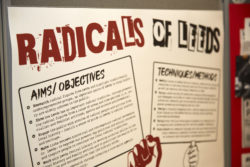FOAH2001 Student Research Partnerships
 Want to get involved in cutting-edge research?
Want to get involved in cutting-edge research?
FOAH2001 Student Research Partnerships (formerly FOAR2000) provides Liberal Arts Students with the opportunity to get involved in the latest research in the Faculty of Arts, Humanities & Cultures, or projects proposed by external partners in collaboration with an academic. By working closely with an academic member of staff and a group of fellow students in a project directly related to ongoing research in the Faculty, you’ll have the chance to undertake research tasks negotiated with your project leader in a structured format and learn how research works as well as creating new knowledge. Throughout the module you will be supported by a range of training workshops to develop your research, analytical, and presentation skills, alongside reflective writing.
Running across both semesters 1 and 2, you’ll have the chance to develop your research and communication skills and gain valuable experience in preparation for your final year project. With plenty of scope to shape the research you undertake and what you are assessed on, FOAH2001 is a unique opportunity to get involved in the latest research in your subject.
Who can take part?
This module is only available to LIBERAL ARTS students.
How does FOAH2001 work?
FOAH2001 combines workshops that all students attend, specific sessions that relate to the skills you need for your project, and dedicated support from your project leader.
In total, you’ll have 10 2-hour workshops, plus project-specific training, and usually meet up with your project leader and / or a Postgraduate student mentor once a week.
How is it assessed?
The module is assessed entirely by coursework and a mixture of individual and group assessment.
- An individual reflective blog (30% of the module mark 10% semester 1, 20% semester 2)
- A group poster presentation (30% of the mark, held during semester 2)
- A group research output (40%, due at the end of semester 2)
To find out more about previous projects and research outputs, please take a look at the FOAR2000 archives.
